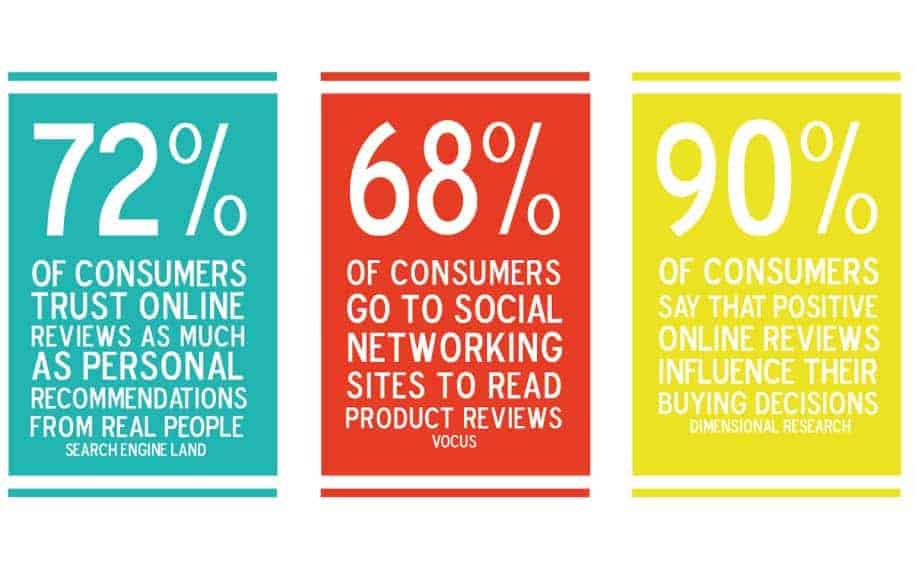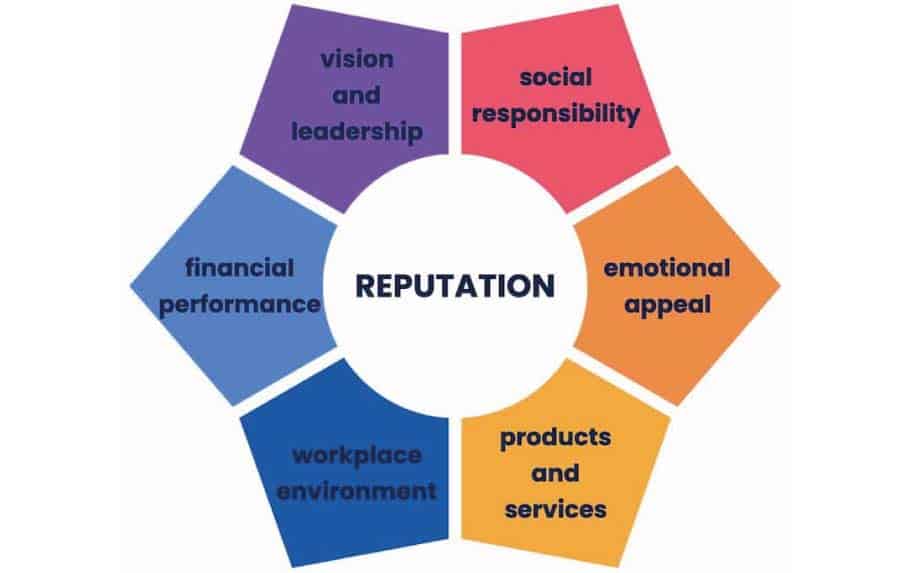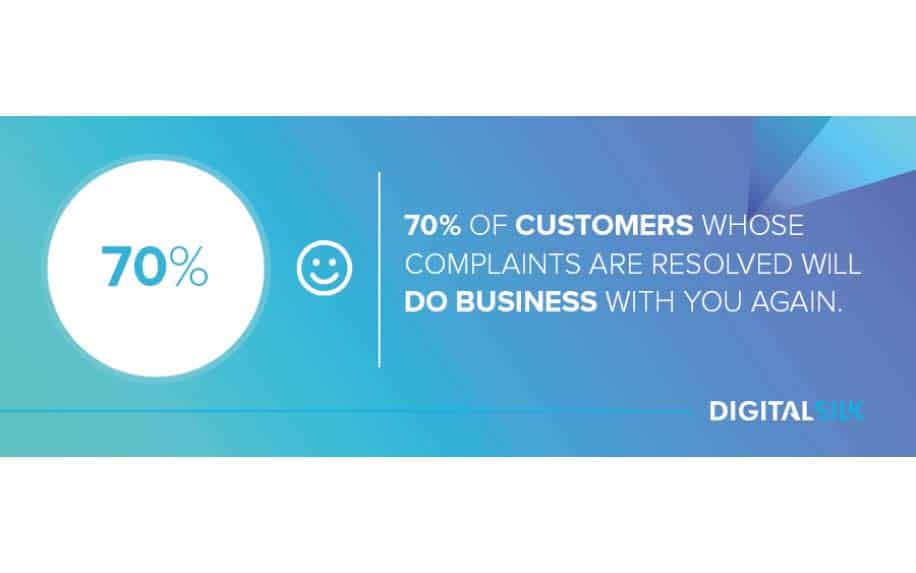What is reputation management? If you haven’t checked lately, simply Google yourself or your company to see what appears in the search engine results. There might be more coverage of your company than you’d expect.
If the information is outdated or negative, this indicates the need for reputation management. This is all about influencing the way customers and other members of the public perceive your business.
Reputation management is the process of influencing and managing the public perception of an individual, organization, or brand. It encompasses all the activities and strategies employed to create, maintain, and restore a favourable image and positive standing within the eyes of key stakeholders, such as customers, employees, investors, partners, and the general public.
Goals of Reputation Management
The primary goals of reputation management are to:
- Build and maintain a positive reputation: This involves establishing and projecting an image that aligns with the organization’s values, mission, and objectives. It also involves consistently delivering high-quality products or services, resolving customer issues promptly, and engaging with stakeholders in a transparent and respectful manner.
- Protect against reputational risks: Reputation management strategies aim to mitigate the impact of negative events, such as product recalls, employee misconduct, or public controversies. This involves crisis communication planning, monitoring online reviews and social media mentions, and proactively addressing potential issues before they escalate.
- Enhance brand awareness and credibility: A strong reputation can significantly boost brand awareness and credibility, which can lead to increased customer loyalty, improved sales, and enhanced investor confidence.
- Foster positive employee engagement: A positive reputation can attract and retain top talent, boost employee morale, and foster a culture of innovation and collaboration.
- Achieve business objectives: Reputation management is an integral part of overall business strategy, supporting the achievement of key objectives such as market expansion, regulatory compliance, and industry leadership.
Read on to find out all you need to know…

Table of Contents
What is Online Reputation Management?
Online reputation management takes a proactive stance to monitor information to be found about a person or company online. After all, things said in the digital word are almost always online on a permanent basis. It makes no difference at all if what is said is true or not.
The Internet Archive even maintains a history of internet web pages that are no longer online. This system dates back to around 1995 when the internet first became a commercially viable service and of great interest to the general public.
They have stored over 330 billion web pages since then. Which means managing your reputation online is essential.
Why Does Your Online Reputation Matter?
Okay, so why does all of this matter? For businesses, the key thing about reputation management is how it impacts your profitability. It’s not just that you want to be liked, it’s that you want to make money.
Reputational damage can harm your revenue streams.
This comes down to consumer behaviour. Essentially, most people are concerned with what their peers think about the businesses they buy from. If you develop a poor reputation, you’ll quickly struggle to make sales.
As such, reputation management is crucial for businesses of all kinds.

Proactive and Reactive Reputation Management
There are two distinct categories of reputation management. These are:
- Proactive reputation management – Where you try to shape and improve your reputation on an ongoing basis.
- Reactive reputation management – When you respond to events, to try and limit damage to your reputation.
In truth, you’ll need both strands. Proactive reputation management helps to eliminate the need for reactive strategies. All the same, it’s only sensible to have a backup plan in place, which is where reactive reputation management comes in.
Essential Elements of Reputation Management
Effective reputation management encompasses several key elements:
- Identifying key stakeholders: Defining the target audience and understanding their perceptions and expectations is crucial for tailoring reputation management efforts effectively.
- Monitoring online presence: Tracking online mentions, reviews, and social media discussions provides valuable insights into public sentiment and potential reputational threats.
- Proactive communication: Actively communicating with stakeholders through various channels, such as press releases, social media interactions, and customer reviews, helps shape the narrative and address concerns promptly.
- Building relationships: Cultivating positive relationships with media outlets, industry influencers, and community leaders can enhance credibility and amplify positive messages.
- Measuring and evaluating: Regularly tracking key performance indicators (KPIs) and assessing the effectiveness of reputation management strategies ensures continuous improvement and optimization.
What is Corporate Reputation Management?
Corporations that interface with the public may have significant amounts of both positive and negative feedback on the internet. Any company that deals with the public will have complaints.
That is inevitable.
However, it is how a company deals with those complaints shows the rest of the public something important.
If the complaint seems like a legitimate one and the company does its best to publicly deal with it in a way that an average person appreciates, then a complaint and the resolution of it can be a positive thing.
This is one reason why proactive management of an online reputation is an important strategy.
It’s also helpful to know how to turn a negative reputation event into a positive one.
This is one of the core goals of reactive reputation management. For example, you might use negative social media coverage to create a positive customer experience, by responding to comments.
Proactive Reputation Management Strategies
There are some standard strategies that any business or person can implement to manage their online reputation. They can either do these things themselves or hire an expert company to do this for them.

The basic steps of reputation management include:
Create an Online Profile on Relevant Websites
This means establishing accounts on all social media systems and any review websites that relate to the business.
Additionally, establish accounts on trade associations, business credit bureaus, with the Better Business Bureau, with the Chamber of Commerce, and any industrial associations that relate to the business.
Regularly Update Postings on Social Media
Regularly posting on social media allows you to shape your own reputation online. This includes Twitter, Facebook, LinkedIn, YouTube, and Instagram depending on the company’s products, services, and public profile.
This helps you to build a strong image of your company in your customers’ minds.
Place Content Marketing on Websites with High Authority Ratings
There are many websites that have a high authority rating such as Forbes, Barron’s, IBT, TechCrunch, and others. Whenever possible, get quality content articles about the company to appear on such trusted resources.
It is actually fairly easy to do this if you have money to burn. For example, contact a Forbes contributor and ask them to post an article that mentions the company on Forbes in exchange for pay.
If not, you might have to aim a little bit smaller. For instance, taking out PR pieces in local newspapers is an effective way to improve your reputation.
Protect the Reputation of Individuals Associated with the Company
If your CEO has a negative online reputation, this reflects poorly on your company. To be effective, you want to track any mentions of anybody associated with the company in a powerful way and that includes major investors as well.
One way to do this is to have guidelines in place for what your employees should post on their social media platforms. These days, it’s not uncommon for someone to lose their job because a social media blunder has called the company’s reputation into question.
Reactive Reputation Management Strategies
There are a number of effective ways to respond to events which may harm your reputation. Here, you’re either trying to limit the damage, or swing events in your favour.
Responding to Complaints
Be as diplomatic as possible when responding to poor reviews. Reality dictates that you can never make everyone happy but potential customers at least need to see that you tried your best to diffuse situations with unhappy customers.
This can happen on both social media and the review site. Be courteous and professional, and respond to each bad review.
Don’t make the customer feel like they are being ignored. You have less control over the bad press, but you can still take matters into your own hands when customers are unhappy and going straight to Yelp instead of you.
Follow up with the customer in private when appropriate. The public needs to see how you are dealing with the situation at hand and that you are indeed going out of your way to please the customer.
Even if the customer will never be satisfied, people will see that you made the effort.
Always respond on the review site first so people can see you take action: they can’t see an email. If the problem is persisting, follow up with the customers in private when it is appropriate to do so such as offering a unique discount code or a refund.

Dead Cat Strategies
Sometimes, the best solution is to simply drown out any negative press you’ve received. One way to do this is to use deadcatting.
This comes from the world of politics. Essentially, if there’s something you don’t want to talk about, you raise more newsworthy, but less damaging topics. The name comes from throwing a dead cat on the table to avoid awkward dinner party conversations.
Content is king when you have loads of bad press and reviews that need to be drowned out in the SERPs.
Challenging bad reviews can be a dead end.
When you’re getting bombarded with them to the point that your profits are being smashed, you need to create a great deal of content. Blog posts, images, videos, stories, anything that has the potential to be shared and linked to a lot.
Good content will rise up in the search ranking and bump the bad reviews and press of that first SERP. Those things won’t go away completely, but most people won’t look past the first page.
As an added bonus, because of the long-term value that content has, it will keep visitors going to your webpages long after it’s been posted.
How to Manage Your Reputation Online
Every person, company, or organisation relies heavily on maintaining a good online reputation and can benefit from engaging a company like ProfileTree to help manage their online reputation.
After all, it is vital to have a system in place to both monitor online reputation and respond appropriately to any derogatory information or complaints.
The reassurance, prevention of damage to your reputation and understanding of what’s being said about you or your company online could become an essential asset to your business.
Why Reputation Management is Vital Today
In today’s digital age, online reputation management has become more crucial than ever before. With the vast reach of the internet and the interconnectedness of social media, a company’s reputation can be shaped and spread within seconds. A single negative review or social media post can have a significant impact on a company’s brand image and customer perception.
Here’s why reputation management is vital today:
- Increased reliance on online reviews: Consumers are increasingly turning to online reviews to make informed purchasing decisions. A study by BrightLocal found that 82% of consumers consult online reviews before making a purchase, and 79% consider online reviews to be as trustworthy as personal recommendations.
- The power of social media: Social media platforms have become powerful tools for shaping public perception. A negative social media post can quickly go viral, damaging a company’s reputation and leading to lost customers.
- The importance of brand trust: In today’s competitive market, building and maintaining brand trust is essential for success. A strong reputation can attract new customers, boost sales, and enhance a company’s ability to retain existing customers.
Key Reputation Management Tactics
Effective reputation management involves a combination of strategies that address both proactive reputation building and reactive reputation repair. Here are some key reputation management tactics:
- Monitoring online presence: Regularly monitoring online mentions, reviews, and social media discussions provides valuable insights into public sentiment and potential reputational threats.
- Proactive communication: Actively communicating with stakeholders through various channels, such as press releases, social media interactions, and customer reviews, helps shape the narrative and address concerns promptly.
- Content strategy: Developing a strong content strategy can help establish the company as a thought leader in its industry and build positive associations with the brand.
- Review monitoring: Actively monitoring online reviews and responding to both positive and negative feedback demonstrates a commitment to customer satisfaction and can help mitigate the impact of negative reviews.
- Crisis communication: Having a well-defined crisis communication plan in place is essential for managing and minimizing the impact of negative events that may damage the company’s reputation.
Integrations with PR and Marketing
Reputation management should not be considered an isolated activity but should be integrated with overall PR and marketing strategies. Here are some ways to integrate reputation management with PR and marketing:
- Align messaging: Ensure that all messaging across PR, marketing, and customer service channels is consistent and reinforces the desired brand image.
- Leverage PR channels: Utilize PR outreach and media relations to promote positive stories and build relationships with key influencers.
- Incorporate SEO: Employ SEO best practices to ensure that positive online content about the company ranks high in search engine results.
- Engage with customers: Actively engage with customers on social media and online review platforms to address concerns and build positive relationships.
Statistics around the impact of poor online reputation and recovery success rates:
- 79% of consumers consider online reviews to be just as trustworthy as personal recommendations. (BrightLocal)
- 91% of consumers are likely to do business with a company that has a positive online reputation. (Search Engine Land)
- 82% of consumers will avoid doing business with a company that has negative online reviews. (Search Engine Land)
- 95% of companies have faced a negative online reputation crisis. (Reputation X)
- The average cost of a reputation crisis is $7 million. (Reputation X)
- Only 22% of companies are able to fully recover from a reputation crisis. (Reputation X)
These statistics highlight the significant impact that online reputation can have on a business’s success or failure. A strong online reputation management services can attract new customers, boost sales, and enhance brand credibility, while a poor online reputation can lead to lost customers, decreased revenue, and damaged brand image.
Here are some additional statistics that demonstrate the impact of poor online reputation:
- 94% of B2B decision-makers say that a company’s online reputation impacts their purchasing decisions. (HubSpot)
- 80% of businesses say that online reviews have increased in importance over the past year. (BrightLocal)
- Negative online reviews can cost businesses an average of 22% of their potential revenue. (Reputation X)
- **The average time to recover from a reputation crisis is 20 months. (Reputation X)
These statistics underscore the importance of reputation management for businesses of all sizes. By proactively managing their online reputation, businesses can protect themselves from potential crises and maximize the benefits of a positive online presence.
FAQ
What is reputation management?
Reputation management is the process of influencing and managing the public perception of an individual, organization, or brand. It encompasses all the activities and strategies employed to create, maintain, and restore a favourable image and positive standing within the eyes of key stakeholders, such as customers, employees, investors, partners, and the general public.
Why is reputation management important?
Reputation management is important because it can significantly impact a company’s success or failure. A strong online reputation can attract new customers, boost sales, and enhance brand credibility, while a poor online reputation can lead to lost customers, decreased revenue, and damaged brand image.
What are the key reputation management tactics?
Key reputation management tactics include:
- Monitoring online presence
- Proactive communication
- Content strategy
- Review monitoring
- Crisis communication
How can I integrate reputation management with PR and marketing?
Reputation management should be integrated with overall PR and marketing strategies. This can be done by:
- Aligning messaging across all channels
- Leveraging PR channels to promote positive stories
- Incorporating SEO best practices
- Engaging with customers on social media and online review platforms
Conclusion
In today’s digital age, reputation management is essential for businesses of all sizes. By proactively managing their online reputation, businesses can protect themselves from potential crises and maximize the benefits of a positive online presence. Reputation management is an ongoing process that requires continuous monitoring, adaptation, and engagement. By implementing effective reputation management strategies, businesses can build and maintain a positive reputation that fosters trust, loyalty, and success.
To find out more about your online PR, speak to ProfileTree today.


